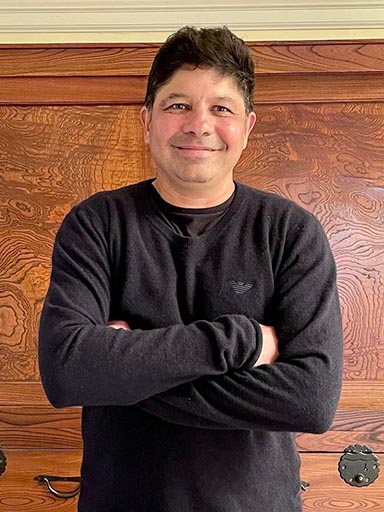Abhay Parekh
“I think if you look at OCW, you see the power of an idea.”
— Abhay Parekh ‘SM ‘86, PhD ‘92

|
When Abhay Parekh, who earned his doctorate in Electrical Engineering from MIT in 1992, first heard of MIT OpenCourseWare, he immediately recognized the potential of the program. “Having grown up in India, I didn’t really feel as a high school student that I had access to all the information that I wanted. If I had the opportunity to take advantage of something like OpenCourseWare I would have had way more fun learning.” Parekh became an early supporter and member of the OCW External Advisory Board in the early 2000s, directing his gift to help establish a pipeline of faculty contributions from the Electrical Engineering and Computer Science (EECS) department to the OCW platform. He quickly saw the value of video and multimedia for students and independent learners alike coming to the OCW site. |
Today, Parekh is an Adjunct Professor of EECS at U.C. Berkeley, and still an avid user of OCW. As part of our 20th anniversary, we asked him to look back on his experience with OCW over the years, and why it still matters for learners and alumni today.
The below has been edited for length and clarity.
What first brought you to OCW?
Once I graduated in 1992, I made it a point to stay in touch and do what I could to help promote MIT’s wider mission. The thing that I thought was game changing about OCW was the fact that it made available this incredibly high quality information to everyone in the world.
What I studied at MIT had to do with the internet and how to make it faster. In those days just being able to send a video over the internet was something. And so being able to watch these great teachers disseminate their information to the world was something that I thought had the potential for changing the world in some way. I was excited because it’s one thing when you get the courses or the handouts. It’s completely different when you can actually see the instructor in a class setting.
I continue to be very excited about OCW. Of course, everything has evolved, but I still think OCW is incredibly relevant, in some sense, even more relevant today.
What have you studied on OCW?
I’m a complete geek at heart, so I’m always learning something. There was a point in time where I had forgotten some of my multivariable calculus, and I remember watching amazing lectures by Denis Auroux on OCW that were terrific. Most recently, I saw most of the videos from a course that was offered in the biology department on the coronavirus. This is a collection of experts, everyone from Dr. Anthony Fauci to Eric Lander and so on. It covers different aspects of the virus—I don’t think I could have gotten that anywhere else.
I use it quite a bit. I’ve probably looked at dozens of courses. Over the years, my kids have used it, and a lot of other people I know take advantage of it. It’s great.
How would you describe the OCW experience in a word or two? Mind-opening
What do you see as OCW’s impact more broadly?
I think that OCW serves a very, very important purpose for students who are extra motivated. Oftentimes when you go to school, your teacher tells you, “This is the way it is.” And, there’s a certain subset of students that are like, “No, but why? I really want to understand why.” I think that I was that kind of student. I was always questioning all kinds of authority and learning. And the system that I grew up in didn’t accommodate that sort of questioning a whole lot. The advantage of OCW, and the advantage of the people who teach courses at MIT is that they tend to cater to that type of student.
What does 20 years of OCW mean to you?
I think the last 20 years have seen an incredible, unbelievable set of advances in the way in which information gets disseminated. And I think if you look at OCW, you see the power of an idea. Initially the videos were limited but still useful at the time and now you have a much more mature OCW that’s kept up with technology.
The fact of the matter is that people sometimes need to learn things in a piecemeal way, or for a very specific purpose. OCW is just a great way to do that. So, I think I would say that 20 years demonstrates that a lot has changed, but the fundamentals have not changed, the fundamental need has not changed. And that’s what I think will happen in the next 20 years. A lot of amazing stuff will happen with technology. But I think the need for OCW will continue.
Why do you think OCW is an important endeavor for MIT?
I think it’s a great way for MIT to fulfill its mission, its broader mission. And it’s great that it’s free. I hope it’s always 100% free.
What is your hope for the future of OCW?
I hope it’s thriving 20 years from now, because I don’t see the need for OCW going away.

